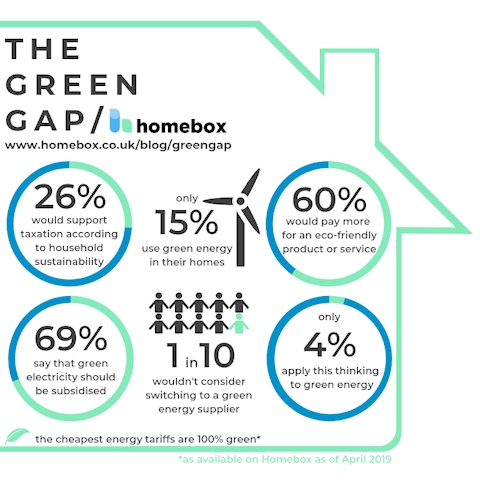Mind The Green Gap
Date published: 23 April 2019

Photo: Homebox
Green energy is the area where we are least likely to put our money
New research into the environmental attitudes and priorities of people living in the North West has identified a ‘green gap’ in our attempts to be more eco-friendly in our homes.
More people in the North West (23 percent of residents) would be prepared to be taxed according to their household sustainability levels than use green energy in their homes (16 percent), despite it being recognised as a priority in a bid to tackle climate change.
Green energy is the area where we are least likely to put our money where our mouth is. 55 percent of North West residents claim they would be willing to pay more for a product or service if it were better for the environment, but only five percent would use a green energy supplier that cost more than a standard supplier.
Almost a third (30 percent) would need green electricity to be cheaper than their standard supplier before they would change. Nearly one in ten wouldn’t even consider switching to a green energy supplier, particularly older respondents, no matter the price.
Over two thirds (70 percent) believe that green electricity should be subsidised to encourage people to use it.
In comparison to buying electricity from green energy suppliers, more people from the North West have stopped buying new clothes to cut down on their consumption (18 percent), support the installation of wind turbines or solar farms nearby (19 percent), holiday in the UK to avoid air miles (23 percent), purchase fair trade items (23 percent) or only flush the toilet when absolutely necessary (51 percent).
When it comes to understanding the impact of their choices in the wider scheme of climate change, 49 percent of people living in the North West feel they have some understanding, but not enough, and more than one in 10 say they have almost no clue at all of how their own choices contribute to climate change.
For example, 56 percent of people claim they would switch to a green energy supplier if it cost the same as their standard supplier. The fact that green energy does cost the same, or less, but people still aren’t switching, demonstrates a clear lack of understanding.
Younger people in particular are confused and inconsistent in their approach to green activities.
According to the national statistics taken from the research, those aged 34 and under are more likely to be pessimistic about their own personal impact on tackling climate change. 76 percent of 18-34-year olds doubt the effectiveness of domestic measures such as using energy efficient light bulbs, growing your own food, or switching appliances off rather than keeping them on standby.
18 percent of people feel guilty about not being more sustainable, rising to 52 percent of 18-24-year olds. 20 percent of under 35s have felt self-conscious when using something they know to be bad for the environment, and this group is three times more likely to pretend to friends or colleagues that they are more sustainable than they actually are.
Younger people (aged 35 and under) are also more than twice as likely as those aged 45+ to have a disposable attitude to fashion, admitting to having thrown away clothing after three years or less. However, this group is also significantly more likely to have turned vegetarian or vegan in a bid to help the environment, with 21 percent of those surveyed having made this choice compared with 10 percent of the nation on average.
Do you have a story for us?
Let us know by emailing news@rochdaleonline.co.uk
All contact will be treated in confidence.
Most Viewed News Stories
To contact the Rochdale Online news desk, email news@rochdaleonline.co.uk or visit our news submission page.
To get the latest news on your desktop or mobile, follow Rochdale Online on Twitter and Facebook.

